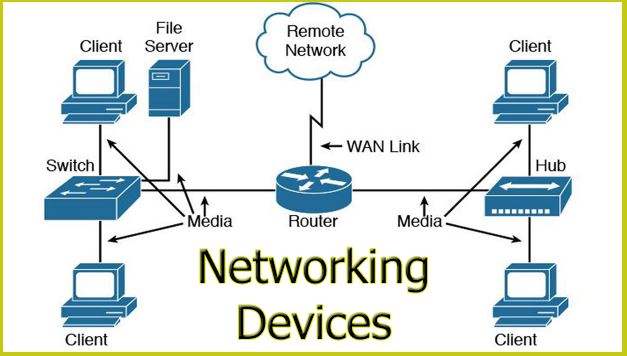A network is a group of computers that are connected together so that they can share resources, such as files, printers, and internet access. Networking devices are the hardware that makes this possible.
There are many different types of networking devices, but some of the most common include:
- Routers: Routers are devices that connect different networks together. They are responsible for routing traffic between networks, and they also provide security features such as firewalls and intrusion detection systems.
- Switches: Switches are devices that connect computers together on a single network. They are responsible for forwarding traffic between computers, and they also provide features such as port security and VLANs.
- Wireless access points: Wireless access points allow computers to connect to a network wirelessly. They are responsible for sending and receiving wireless signals, and they also provide features such as security and bandwidth management.
- Modems: Modems are devices that connect computers to the internet. They convert digital signals from computers into analog signals that can be transmitted over telephone lines or cable lines.
In addition to these common devices, there are many other types of networking devices, such as hubs, gateways, and firewalls.
To choose the right networking devices for your network, you need to consider the following factors:
- The size of your network: The number of computers on your network will determine the number of ports you need on your switches and routers.
- The type of network you have: If you have a wired network, you will need different devices than if you have a wireless network.
- The security features you need: If you need to protect your network from unauthorized access, you will need devices that have security features such as firewalls and intrusion detection systems.
- The budget you have: Networking devices can range in price from a few dollars to thousands of dollars.
Once you have considered these factors, you can start shopping for networking devices. There are many different brands and models of networking devices available, so you should be able to find the right devices for your needs.
Here are some additional tips for choosing and using networking devices:
- When choosing networking devices, it is important to buy from a reputable brand. This will ensure that you are getting quality devices that will last.
- It is also important to buy devices that are compatible with each other. This will save you time and frustration when setting up your network.
- Once you have your networking devices, it is important to configure them properly. This will ensure that your network is secure and that you are getting the most out of your devices.
- Networking devices can be a complex topic, but it is important to understand the basics. By following these tips, you can choose the right networking devices for your needs and set them up properly.
I hope this beginner’s guide to networking devices has been helpful. If you have any further questions, please feel free to ask.









Be the first to write a comment.